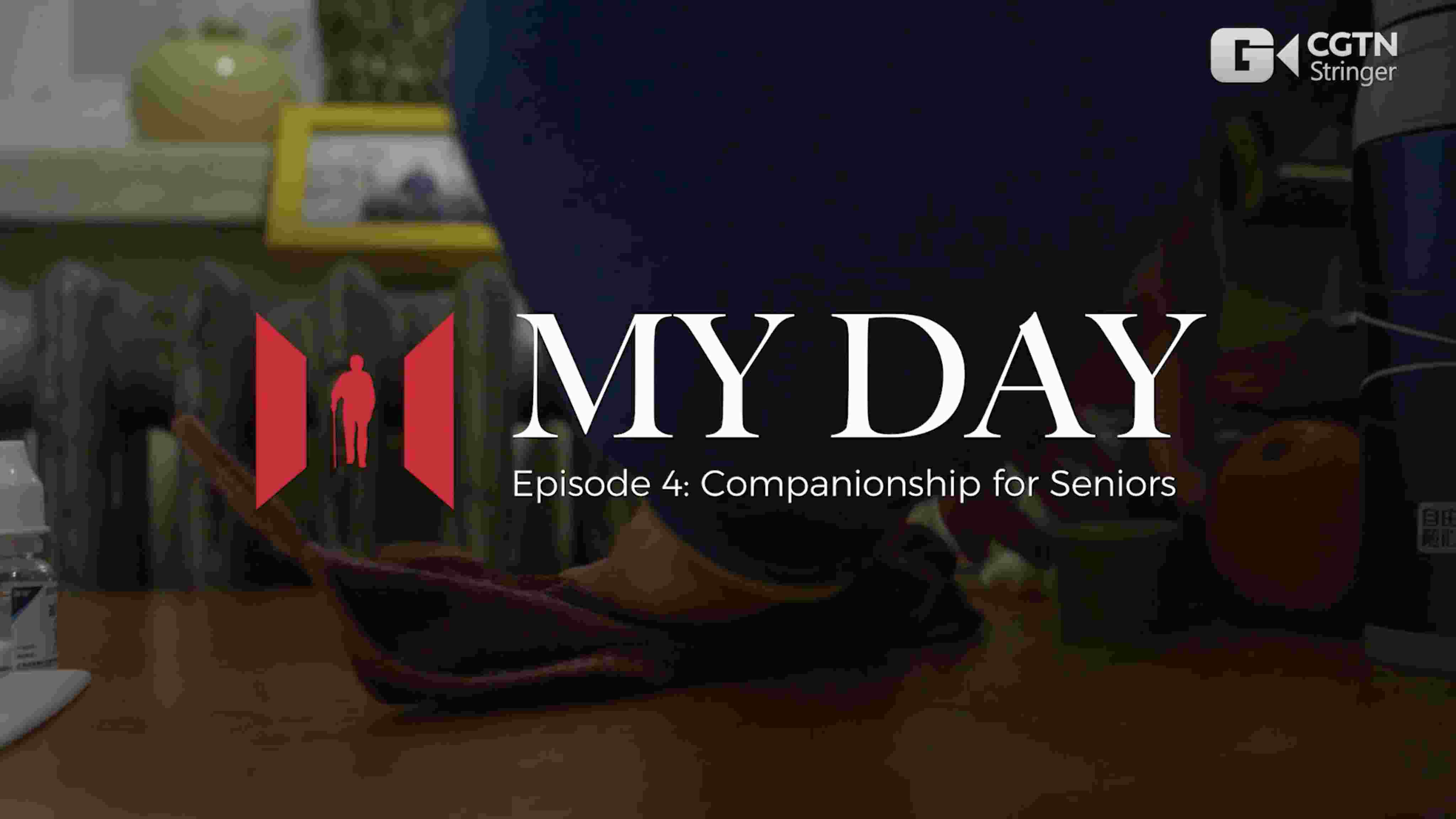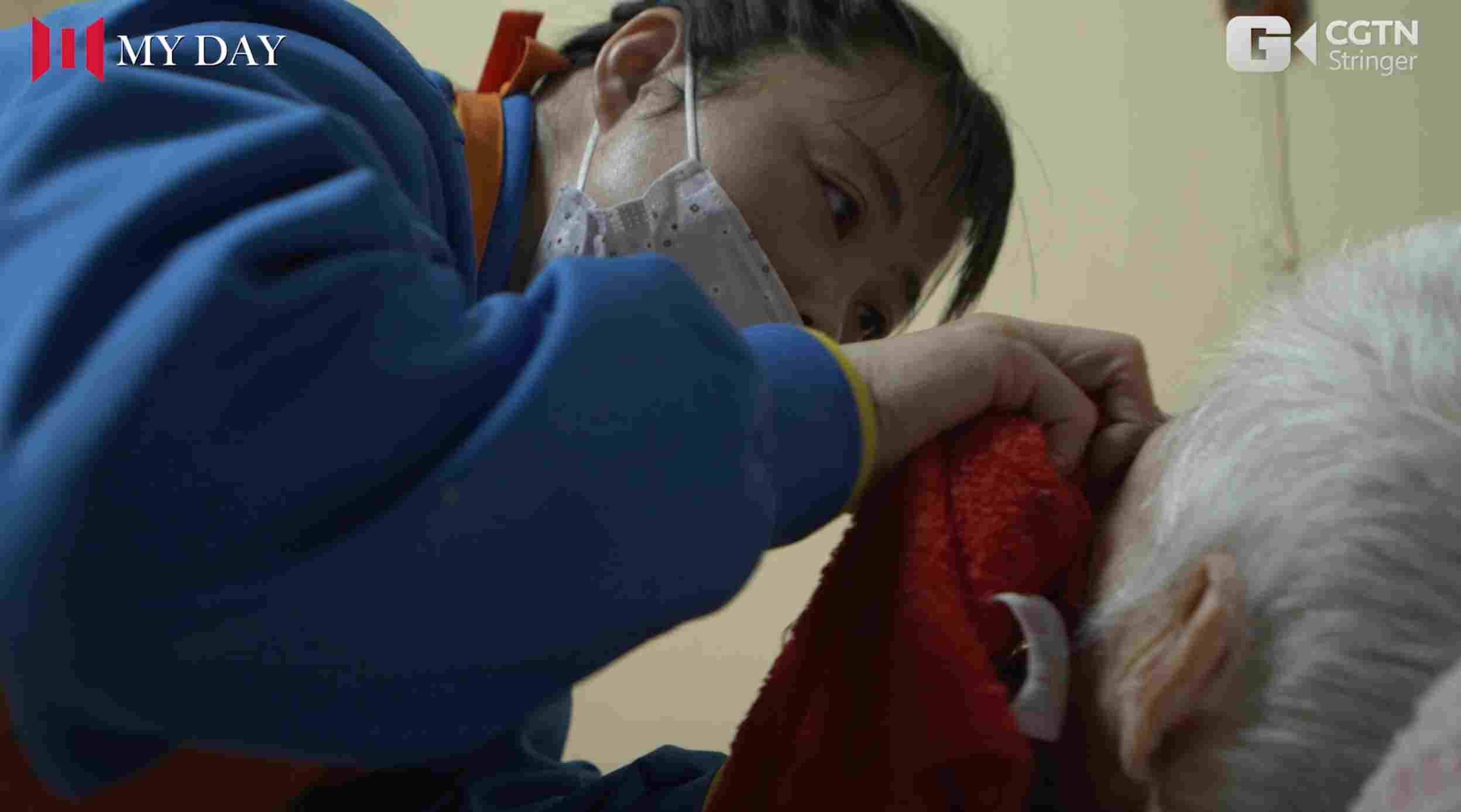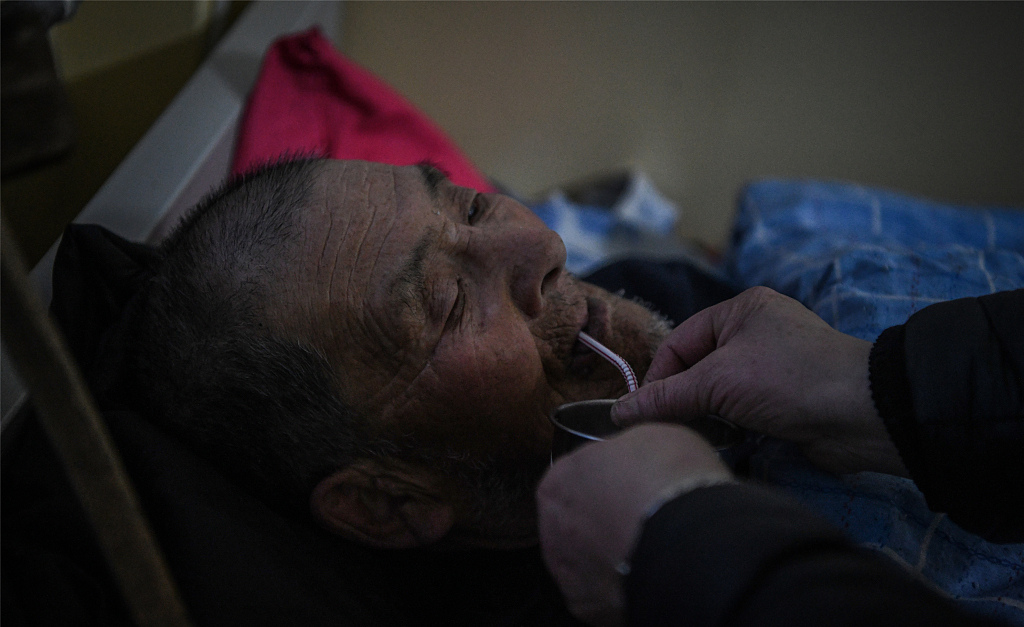
Domestic
19:12, 15-May-2019
The vital role of caregivers for an aging China
Updated
21:33, 15-May-2019
By Yu Jing
05:40

Watching 39-year-old Liu Yanmei feeding elders in the senior care center, one gets to see the immense difficulty of a caregiver's job.
"Just one more bite… you are the best," said Liu, holding a bowl of milk in her left hand, and a drinking straw to feed the bedridden granny in the right hand. Seeing the granny push her head aside, Liu pushed the straw a little closer to the elderly's mouth, and comforted her, "just a little more."
This is the daily routines of a caregiver who provide care for elders in China. As China ages, caregivers are becoming the indispensable people for the country's rising elderly population.
According to a study by the Chinese Academy of Social Sciences published earlier this year, by 2030, one-quarter of China's population is expected to be aged 60 or older. By 2050, that figure will jump to 487 million, or 35 percent of the population.
Due to the one-child policy, the youth will find themselves ill-prepared for the aging crisis. The family structure in China now is a reverse pyramid where one couple supports two parents, and possibly four grandparents. Due to the busy work schedule in big cities, sending aging parents to an institutional senior care center, a choice that used to be frowned upon in Confucius Society is increasingly becoming the go-to option.

Liu Yanmei helps an elder wash her face. /CGTN Photo
Liu Yanmei helps an elder wash her face. /CGTN Photo
To provide care for that large number of seniors, caregivers like Liu have an incredibly busy work schedule. Every day, Liu gets up at 6:30 a.m., cleans up the room for elders, wipes the table, and sweeps the floor. As elders get up one by one, Liu walks them to the bathroom to do self-cleaning.
But to take care of bedridden elders like Auntie Xu, Liu's burden would be much more substantial.
"When I first came, I couldn't stand taking care of disabled seniors," said Liu in an interview with CGTN. "It is unbearable to clean their urine and feces."
It is of no surprise that Liu has been so busy. In senior care centers all over China, a shortage of caregivers is common.
"Only high-end senior care centers or state-funded senior care centers can recruit caregivers easily," said Liu Yan, manager of two senior care centers in Beijing's Chaoyang District. Low salary and heavy workload are the primary reasons for the personnel shortage, she added.
The monthly salary for caregivers ranges between 3,000 yuan to 4,800 yuan, though the senior care centers cover their housing and food. The job is essentially a 24-hour one. During the night, if elders want to use the bathroom or drink water, caregivers have to stay by their side.
A shortage of caregivers is especially acute during the Spring Festival when most would go back home to reunite with their family, said Liu. Since senior care centers need to maintain their operation during the holiday, those caregivers who are asked to stay would rather quit their job.

A caregiver helps an elderly patient sip water at a senior care center. /VCG Photo
A caregiver helps an elderly patient sip water at a senior care center. /VCG Photo
A study shows that by the end of 2017, there were only 300,000 certified caregivers in China, while the population of elders aged over 65 reached 40 million. In 2017, to encourage more people to become caregivers, the state abolished the certificate requirement – anyone who wants to become a caregiver can take up the job with the consent of an employer.
But this brought another unintended consequence – the quality of caregivers may suffer.
In Dongzhimen Street senior care center where Liu Yanmei works, when the weather is good, she would take the elders outside and teach them to read images and characters, an exercise that can reduce the risk of Alzheimer's for the elders.
But not all caregivers could guide the exercise. In Liu Yan's senior care center, a few caregivers could not read characters themselves since they did not finish primary school education. China's Xinhua news agency reports that among the 300,000 certified caregivers in China, 70 percent did not complete high school education.
Since there is no nation-wide test for caregiver, there is also no necessary national or industry-wide training for caregivers. In the senior care center that Liu Yan operates, she organizes training for new recruits which covers some of the most basics, including how to put an elder on a bed, how to feed an elder, etc.
"90 percent of the new recruits did not have any credentials in caregiving, thus we have to offer training," said Liu.

The senior care center that Liu Yan operates /CGTN Photo
The senior care center that Liu Yan operates /CGTN Photo
There is a lack of institutional education for caregivers, especially at the time when the population in China ages at this unprecedented speed, said Lu Jiehua, professor of sociology at Peking University. Vocational schools that offer training in caregiving cannot meet the high market demand.
To encourage young talents to enter the market, industry-wide alliance, or non-state actors, should now provide greater guidance, Lu said, for example, linking caregivers' salary with their credentials to show that there is a clear career path.
"It takes a lot of sympathy and patience to work here," Liu Yanmei said looking back at her three-year experience working at the senior care center. But society should also do its part to let encourage people to stay in the industry.
This is the fourth episode of our “Aging Society” series. You can watch the first three episodes here: Elders in South Korea stay young by choosing never to retire; Old age in rural China; Why the homeless in the United States are greying. Stay tuned for more stories in the coming weeks.

SITEMAP
Copyright © 2018 CGTN. Beijing ICP prepared NO.16065310-3
Copyright © 2018 CGTN. Beijing ICP prepared NO.16065310-3